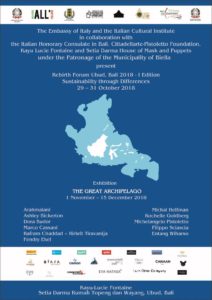Romanticism and the 19th and 20th centuries sang the epic of the individual, replicating the narrative in thousands and thousands of forms and stories, on which the modern collective imagination fed. It coincided precisely and specifically with an industrial development based on the working class, which was itself founded on the figure of the individual, i.e. a single subject offering their labour within a structure organized in the shape of a productive apparatus. Industry and individual have fuelled the myth of progress, driven by technological advancement. From a political point of view, this model of socio-economic development contributed to generating a liberal system. To complete this obviously extremely simplified scenario, the liberal system identified itself with democracy.
This extraordinary structure, which greatly emancipated humanity, protecting it (even if not always completely) from the terror of wild beasts, hunger, diseases, war and biblical plagues, has revealed itself to be clearly unsustainable. The risk to the future of humanity is in fact posed by the global warming, the economic unbalance, the mass of plastic in the ocean, the non-renewability of oil, the life styles spreading old and new diseases and so on: the list of our evils is by now long and well defined.
We are facing a brand new scenario: it is a third world war. The third world war has broken out. And it is not being fought between countries, so this time there’ll be no winner. The third world war is fought by us against ourselves: we are the ones making our present unsustainable.
What’s happened to the epic of the individual in the face of the urgency and the absolute emergency of this scenario? What’s left of the hero of this story? Who will – if anybody could – replace him?
Michelangelo Pistoletto has identified in the myth of the Third Paradise the narrative able to show us a new perspective. A harmony between the first paradise – whose ideal is based on nature – and the second one, characterized by the artificial progress constituting the epic. This harmony corresponds to a mythical third terrestrial and universal paradise.
Personally, I have identified in the demopraxy – a notion replacing the term cratòs (government) with praxis (practice), please see the text “The Art of Demopraxy” included in this publication for an in-depth dissertation on the subject – and above all in the organization the contemporary declinations corresponding to a modern paradigm of the ideal of democracy and the figure of the individual as a hero. It is time to gain full awareness of the fact that any form of social gathering is made of organizations, by which we mean associations, foundations, companies, public and private bodies, profit and non-profit institutions, consortiums, committees, clubs, work groups and any other form of organized collaboration. The family itself, or even just the couple, is, in minimum terms, a form of organization of social life. People spend hours, days, years immersed in organizations. In them, every day they make choices and take decisions concretely impacting the lives of workers, entrepreneurs, suppliers, customers, associates, participants and family members. All organizations are micro-governments or micro-parliaments in themselves, spread across the social fabric. Practices carried out in them actually exercise power. The organization is the hero of the demopractic system. On the one hand the individual and on the other the whole collectivity can learn to interact with the organizations to manage together the emergencies our planet must inexorably face. World peace doesn’t reside in the ability to deploy national armies against each other, but in practising methods of integration and participation of all the three above-mentioned components of the social fabric.
It is an art we have to learn and to a great extent still have to found; its instruments, its languages and its methods are being experimented with by Cittadellarte and the Embassies of the Third Paradise, together with experts from every sector, scientists and administrators, philosophers and entrepreneurs, politicians and religious people, and the representatives of any other professional or personal vocation.
In this scenario, the Rebirth Forum is therefore an operative device, an open laboratory, and above all a space for learning, researching, sharing, actual experimenting with practices based on sustainability, specifically in reference to the 17 Sustainable Development Goals defined by the United Nations, itself an organization.
Thanks to the offices of the direction of the Italian Institute of Culture and the collaboration with local organizations (active at both local and global level) promoted by the Institute, together with Kayu Lucie Fontaine, Ubud becomes one of the places on the planet in which world peace is practised.


